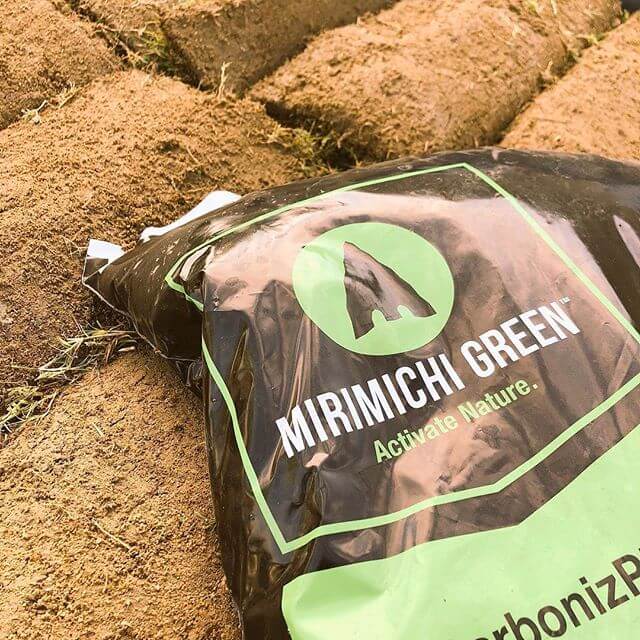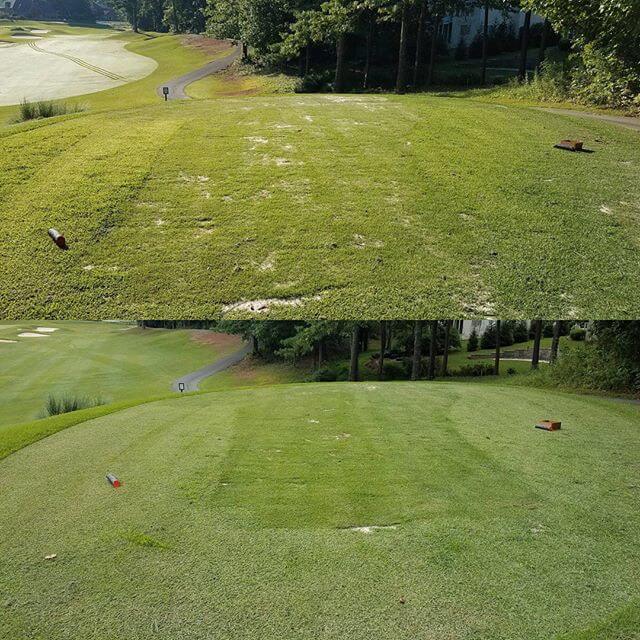
Mirimichi Green, Justin Timberlake Family Go from Golf Course to High Growth in NC

As algae blooms fed by chemical fertilizer runoff from farms and lawns contaminate more waterways every year, a North Carolina company is rooting its future in high-end eco-sensitive plant-growing products.
Mirimichi Green Express, headquartered in the Southeastern North Carolina community of Castle Hayne, near Wilmington, handles manufacturing, sales and distribution of the Mirimichi Green product line.
Russ Britton, CEO, and Web Cowden, COO, formed the company in 2013 with equity input by famed Tennessee singer-songwriter Justin Timberlake and members of his family. Two years later they officially launched a full line of proprietary products designed to nurture plants with the help of nature.
The concept originated in 2008 when the Timberlake group bought the Mirimichi Golf Course outside Memphis. They invested heavily to make the course environmentally friendly. After only one year it became the first golf course in the United States to be certified by the Golf Environment Organization for its sustainability.

The Timberlake family sold the course in 2013, but the technologies developed during their five-year environmental success with the course became the foundation for the Mirimichi Green brand of products.
Now the company offers tailored programs for landscapers, developers, educational institutions, golf courses, government agencies, parks and recreation departments, equine farms, corporate sustainability initiatives and others. Customers include Duke Energy, the Miami Dolphins, the University of North Carolina’s Kenan Stadium, Duke University, the Broken Sound Golf Club in Boca Raton, Florida, and the Sentosa Golf Club in Singapore, just to name a few.
Mirimichi Green soil products are made from 100 percent renewable biomass, including landfill-derived materials, and also contain wastes from biomass energy production. The company’s soil products are made from clean, natural, non-toxic organic materials and include U.S. Department of Agriculture-certified biobased carbon, and compost certified by the U.S. Composting Council.
Cowden says the company’s soil products contain no fossil-fuel-derived or -mined materials. Instead, they actually sequester carbon. “Corporations and universities love it. They can offset some carbon with it,” he says. The core components of the firm’s granular products are bio-activated carbon, inoculated with high-nutrient organics.

“The carbon is really our niche piece,” Cowden says. “The carbon is a very porous structure; the process by which we make this is called pyrolysis (using extreme heat to simulate the chemical decomposition of organic material). What you’re left with is a very porous crystalized structure that has a very high carbon content and a very low ash content. It can hold air, water and nutrients within its pore structure, and makes them available to the plant when they are needed.
“Carbon is on the market. We have a higher-quality carbon, a much cleaner carbon, than what is on the market today. It’s something that really has never been commercially available and at an affordable price. Because the carbon portion has a half-life of around 500 years, we describe the product as a ‘permanent soil amendment.’”
An equity partner developed the broad-spectrum liquid fertilizers and bio-stimulants Mirimichi sells. “It’s a high-end line,” says Cowden, “They contain 70-plus micronutrients, organic enzymes and extracts.”
The micronutrients, he explains, have been reduced to a very small size so they’re taken up by plants immediately, even by the leaf. Just this year the company also introduced a natural pest control. According to Cowden, “it kills like a neurotoxin and deters like organics. It’s the only one on the market with efficacy data on kill rates.”
The company’s focus remains on the environment that supports the changing ecology. “Research and development efforts are important to continue to build upon our unique carbon technology and organic nutrients. We’re coming up with a lot of new technology working with other biotech partners,” said Cowden. An example is a spreadable version of Mirimichi’s soil-amendment product.
The company is exploring a variety of additional funding opportunities and will be entering the bio-agricultural market soon. ‘We are currently in negotiations to take our first into ag. Britton grew up in a farming family and is excited to bring new technology to the ag market with our carbon-based nanotechnology.” The company has already tripled in size in its first three years on the market.
“We’re on track for substantial growth and are putting everything in place in order to do that,” Cowden says. “We think we have a good thing going. We plan to keep our eye on the ball and finish what we started.”
